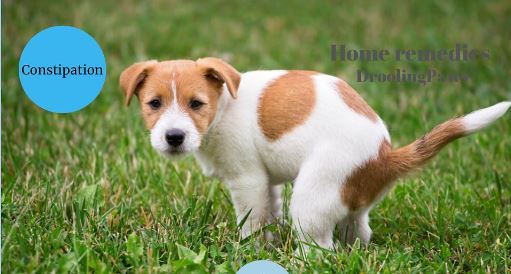Constipation in dogs is a common gastrointestinal issue that can cause discomfort and distress. While severe cases require immediate veterinary attention, mild constipation can often be alleviated with simple home remedies. This guide outlines evidence-based strategies derived from research and veterinary expertise to help manage dog constipation effectively at home.
- Increase Water Intake:
Proper hydration is fundamental to maintaining healthy bowel movements in dogs. Ensuring your dog has access to fresh, clean water at all times is the first step in treating constipation. Dehydration can exacerbate constipation, so it’s crucial to monitor water intake, especially in warmer climates or during increased physical activity.
- Dietary Adjustments:
- Fiber-Rich Foods: Research indicates that increasing dietary fiber can aid in regulating bowel movements. Introduce high-fiber foods like canned pumpkin, cooked sweet potato, or bran into your dog’s diet. These sources of soluble fiber help soften stools and promote regular bowel movements.
- Moist Food: Wet or canned dog food contains higher moisture content compared to dry kibble. This extra hydration can assist in easing the passage of stool through the digestive tract. Consider incorporating moist food into your dog’s diet to alleviate constipation.
- Healthy Fats:
Olive oil or coconut oil can serve as effective natural lubricants for the digestive system. These oils can be added in small quantities to your dog’s meals to help facilitate the movement of stool through the intestines. Research suggests that incorporating moderate amounts of healthy fats can aid in relieving constipation.
- Exercise and Physical Activity:
Regular exercise is crucial for maintaining overall canine health, including a healthy digestive system. Engaging your dog in physical activities like walks, playtime, and fetch can stimulate bowel movements. Research indicates that exercise helps in regulating gastrointestinal motility, potentially reducing the risk of constipation.
- Probiotics and Prebiotics:
- Probiotic Supplements: Probiotics are beneficial bacteria that promote a healthy gut microbiome. Research has shown that supplementing a dog’s diet with probiotics can improve digestive health, potentially alleviating constipation.
- Prebiotic-Rich Foods: Prebiotics are dietary fibers that serve as food for beneficial gut bacteria. Incorporating prebiotic-rich foods like oats, barley, and certain fruits and vegetables can support a balanced gut microbiome, contributing to regular bowel movements.
- Gentle Abdominal Massage:
A gentle massage of the abdomen in a circular motion may help stimulate bowel movements in dogs. Research suggests that this technique can aid in relieving constipation by promoting natural peristaltic movements in the intestines.
- Over-the-Counter Remedies:
In some cases, veterinarians may recommend over-the-counter remedies such as mineral oil or polyethylene glycol (found in products like Miralax) for short-term use. However, it’s essential to consult a veterinarian before administering any medication to ensure proper dosage and safety for your dog.
- Avoid Certain Foods:
Do not feed your dog bones, as they can cause blockages. Avoid dairy products if your dog is lactose intolerant, as this can exacerbate constipation.
- Over-the-Counter Remedies:
In some cases, veterinarians may recommend over-the-counter remedies such as mineral oil or polyethylene glycol (found in products like Miralax) for short-term use. However, it’s essential to consult a veterinarian before administering any medication to ensure proper dosage and safety for your dog.
Effectively managing dog constipation at home requires a multifaceted approach involving hydration, dietary adjustments, exercise, and, in some cases, targeted supplements or remedies. While these strategies are generally considered safe, it’s crucial to consult with a veterinarian, especially if constipation persists or worsens. Remember that severe or chronic cases of constipation should be promptly addressed by a veterinary professional to rule out underlying health issues.

